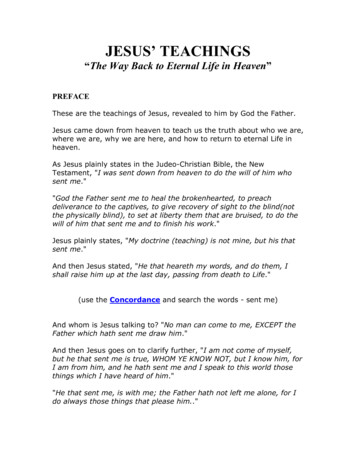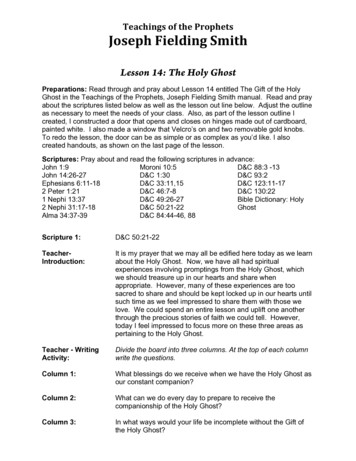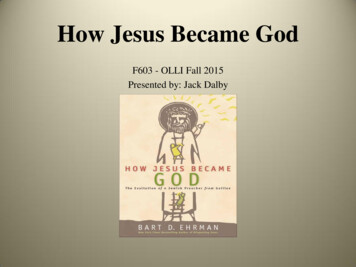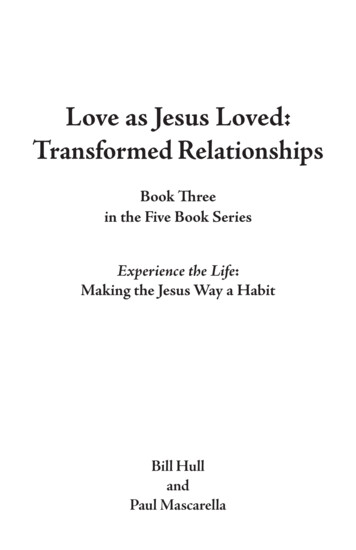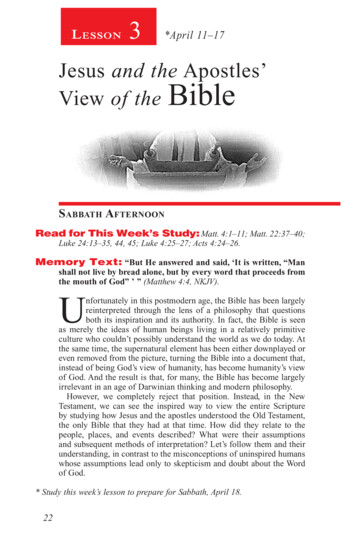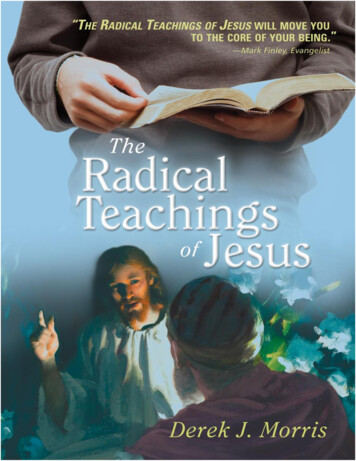
Transcription
The Radical Teachings of JesusDerek J. Morris
2
TABLE OF CONTENTSAcknowledgmentsIntroductionChapter 1What Jesus taught about Himself-Radical Claims of Jesus-What His Followers Said-Authenticity of John’s Testimony-The Testimony of Saul-The Testimony of Peter and John-The Testimony of Evil Spirits-The Testimony of WillChapter 2What Jesus taught about the Scriptures-Scripture Discounted as Myth-The Word of God-Old Testament Stories-Moses and King David-Defense Against the Enemy-Defense Lessons-Testimony about Jesus Christ-ChallengeChapter 3What Jesus taught about salvation-Jesus Teaches Nicodemus-Fiery Serpents-Serpent on a Pole-Lifted Up-The Rich Young Ruler-Zacchaeus-Prophets and Apostles-Baptism and the GiftChapter 4What Jesus taught about His return-The Good News-The Bad News-The Most Important News-Wild FiresChapter 5What Jesus taught about the Sabbath-The Ten Commandments-Two “Problems”-Jesus and the Sabbath-Sabbath Made for Man-Blessing My Neighbor-Overturning the Traditions-Man at the Pool of Bethesda-A Crippled Woman-Man with a Withered Hand-Lies in the Garden3
-The Creator’s GiftChapter 6What Jesus taught about the judgment-A Day of Judgment-Good News-More Good News-The Best News-Death to Life-Too Good to Be True?Chapter 7What Jesus taught about death-Rich Man and Lazarus-Another Lazarus-The Silence of Lazarus-Paul’s Teaching on Death-Jesus Holds the Keys-What Happens to the Unrepentant?-ReunionChapter 8What Jesus taught about His church-Whose Church?-Called Out-My Church-This Rock-Binding and Loosing-Prevailing4
AcknowledgmentsI want to express my appreciation to the numerous individuals who have provided encouragement and assistance inthe development of this book:To Mark and Teenie Finley, Todd Gessele, Gene Heinrich, Paul Johnson, Diane Levy, Dan Serns, SueWalden, Larry Witzel and the team in Vancouver, WA, who provided the context for this manuscript to be born.To Eve Parker, and Nancy Vasquez—who provided invaluable feedback in the shaping and editing of themanuscript.To my beloved wife, Bodil—who has always encouraged me to fix my eyes on Jesus, the Author andFinisher of our faith, and to boldly proclaim the radical teachings of Jesus.Each of these individuals, along with others unnamed, encouraged me to sit at the feet of Jesus, listencarefully to His radical teachings, and share what I have learned with others.Most of all, I want to thank Jesus, my Savior and Lord. I am fully persuaded that Jesus is all He claimed tobe—Son of God, Messiah, Savior of the world, and soon coming King! I echo the testimony of the great prophetJohn the Baptist: “Behold, the Lamb of God, who takes away the sin of the world. I have seen and testified that thisis the Son of God!”5
IntroductionWe are currently in the midst of an amazing miracle of God! Since the publication of The Radical Prayerin 2008, more than 40,000 copies have already been printed. The Radical Prayer has been translated into numerouslanguages, and thousands of study groups have been launched across North America and around the world usingThe Radical Prayer DVD series.1. But that is just the beginning.Since I personally responded to the appeal of Jesus, crying out to the Lord of the harvest to throw me outinto His harvest, God has been working in miraculous ways in my own life. In the spring of 2009, I was thrown outto Vancouver, Washington, to conduct a citywide series of meetings on The Radical Teachings of Jesus. Thepresentations stretched me to the limit—I felt like a lamb, just like Jesus had foretold! In spite of some radicalchallenges, I learned to radically depend upon the Lord of the harvest. The result? I returned with radical joy, notonly because I saw with my own eyes that the harvest truly is great, but also because I experienced the joy ofsalvation through Jesus Christ our Lord in a deep and personal way.This book is the result of that miracle. It is my prayer that as you join me on a journey, exploring TheRadical Teachings of Jesus, your own life will be transformed.1.To learn more about The Radical Prayer, go to www.TheRadicalPrayer.com.
Chapter 1What Jesus taught about HimselfHave you heard the latest “news” about Jesus? Some say that Jesus married Mary Magdalene and fathereda child. Others assert that Judas was the real hero in the Gospel story. If you haven’t studied the story of Jesus foryourself, you could easily be led astray. What did Jesus have to say about Himself and are His radical claims true?Radical Claims of JesusJesus was bold in His declarations about Himself. The apostle John remembered and recorded those radicalclaims: “I am the way and the truth and the life. No one comes to the Father except through Me” (John 14:6).1 “I am the light of the world. He who follows Me shall not walk in darkness, but have the light of life”(John 8:12). “I am the bread of life. He who comes to Me shall never hunger, and he who believes in Me shall neverthirst” (John 6:35). “I am the resurrection and the life. He who believes in Me, though he may die, he shall live. Andwhoever lives and believes in Me shall never die” (John 11:25–26). “Most assuredly, I say to you, before Abraham was, I AM” (John 8:58). “My Father has been working until now and I have been working” (John 5:17). “He who has seen Me has seen the Father” (John 14:9).Radical claims indeed! The renowned Christian apologist C. S. Lewis was right when he asserted thatJesus didn’t give us the option to recognize Him as merely a great moral teacher. Jesus was either a lunatic, totallyout of touch with reality, a malicious deceiver intent on leading others astray, or He was and is who He claimed tobe—the Messiah, the Savior, the Son of God.2
Jesus left us with no doubt about whom He believed Himself to be: “I have come down from heaven not todo My own will but the will of Him who sent Me” (John 6:38). Of course, anyone can make outrageous claims likethat. There is probably someone in your city right now that claims to be the Messiah. How do we know the radicalclaims of Jesus are true? To find an answer to that question, we must begin with the testimony of the early followersof Jesus.What His Followers SaidJohn the Baptist was one of the first to testify about Jesus. When he saw Jesus coming to the river Jordanto be baptized, he cried out, “Behold! The Lamb of God who takes away the sin of the world!” (John 1:29). Afterbaptizing Jesus, John the Baptist gave this startling testimony: “I saw the Spirit descending from heaven like a dove,and He remained upon Him. . . . And I have seen and testified that this is the Son of God” (John 1:32, 34). Thetestimony of John the Baptist was clear: he boldly declared that Jesus was the Son of God!A godly woman named Martha, the sister of Mary and Lazarus, gave her testimony about Jesus. Marthaand her siblings, Mary and Lazarus, were close friends of Jesus. They knew Him well and loved Him. Martha gavethis confession as she conversed with Jesus near the grave of her brother Lazarus: “I believe that You are the Christ,the Son of God, who is to come into the world” (John 11:27).Even skeptics experienced a radical change in their lives when they had a personal encounter with Jesus.When Nathanael’s friend Philip said he had found the Messiah, a teacher from Nazareth, Nathanael replied, “Cananything good come out of Nazareth?” But when Nathanael met Jesus face to face, he was convicted that Jesus wasno ordinary man, and certainly not a lunatic or a malicious deceiver. Here is Nathanael’s testimony: “Rabbi, Youare the Son of God! You are the King of Israel!” (John 1:49).Thomas was another skeptic who became a disciple of Jesus. After the resurrection of Jesus, Thomasstruggled to believe that Jesus was actually raised from the dead. When Thomas eventually met the risen Christ,when he saw Jesus with his own eyes and touched Him with his own hands, he exclaimed, “My Lord and my God!”(John 20:28).3
You may have noticed that all the radical claims of Jesus cited above and all the testimonies about Jesus aretaken from the Gospel of John. One of the first disciples of Jesus, John, son of Zebedee, wrote his Gospel with thespecific purpose of convincing people about who Jesus was. He gave this testimony at the conclusion of his Gospel:“And truly Jesus did many other signs in the presence of His disciples which are not written in this book; but theseare written that you may believe that Jesus is the Christ, the Son of God, and that believing you may have life in Hisname” (John 20:30–31, emphasis added).Authenticity of John’s testimonyJohn’s Gospel gives such a sophisticated picture of Jesus that many liberal scholars question itsauthenticity. They suggest that the Gospel of John must have evolved over a century or more, and propose that itwas written late 2nd century AD, long after John’s death. They say the Gospel of John may contain a few fragmentsof true tradition, but in its present form it is not an authentic testimony from the disciple “whom Jesus loved” (John21:20).However, an archeological discovery in the 20th century provided evidence reaffirming a late 1st centurydate for the writing of the Gospel of John, thus supporting its authenticity as the work of the aged apostle John. In1920, a collection of papyri was purchased in Egypt and added to the Rylands Library in England. One papyrusfragment from that collection was translated and first published in 1935. It became known as the Rylands Papyrus457, or P52. Paleographers—scholars who specialize in dating documents based on writing styles—were excited todate this ancient papyrus as early 2nd century, perhaps around AD 125. On it was a portion of the Gospel of John.Already published in codex form rather than a conventional scroll, the evidence clearly pointed to a late 1st centurydate for the writing of John’s Gospel, just as Christians had believed through the centuries. I am convinced thediscovery of that ancient papyrus was divinely directed to strengthen the faith of Christians and to affirm theauthenticity of John’s testimony.Perhaps you are wondering what was written on that papyrus fragment. It was portions of John 18:31–33on one side and portions of John 18:37–38 on the reverse side. “Then Pilate said to them, ‘You take Him and judgeHim according to your law.’ Therefore the Jews said to him, ‘It is not lawful for us to put anyone to death,’ that the4
saying of Jesus might be fulfilled which He spoke signifying by what death He would die. Then Pilate entered thePraetorium again, called Jesus, and said to Him, ‘Are you the King of the Jews?’” (John 18:31–33).On the reverse side of the fragment we find additional portions of this conversation between Pilate andJesus. “Pilate therefore said to Him, ‘Are You a king then?’ Jesus answered, ‘You say rightly that I am a king. Forthis cause I was born and for this cause I have come into the world, that I should bear witness to the truth. Everyonewho is of the truth hears My voice.’ Pilate said to Him, ‘What is truth?’ And when he had said this, he went outagain to the Jews and said to them, ‘I find no fault in Him at all’” (John 18:37–38).What a remarkable testimony, recorded on an ancient papyrus! “Everyone who is of the truth hears Myvoice!” We all have the power to choose the one to whom we are going to listen. There are distractions and fancifulfabrications all around us. There always have been. It’s part of the great controversy between good and evil. ButGod has provided compelling evidence that the testimonies about Jesus are reliable and the radical claims of Jesusare true!The Testimony of SaulOne of the most compelling testimonies regarding the truth about Jesus comes from Saul of Tarsus whowas once a fierce and ruthless enemy of Jesus and all who followed Him. Saul, later called Paul, gave thisconfession before King Agrippa: “Indeed, I myself thought I must do many things contrary to the name of Jesus ofNazareth. This I also did in Jerusalem, and many of the saints I shut up in prison, having received authority from thechief priests; and when they were put to death, I cast my vote against them. And I punished them often in everysynagogue and compelled them to blaspheme; and being exceedingly enraged against them, I persecuted them evento foreign cities” (Acts 26:9–11).Saul was a witness at the stoning of Stephen, one of the followers of Jesus. That execution was indeliblyimprinted on Saul’s memory and the convictions generated by Stephen’s death would be with Saul forever. Stephenhad just given a powerful testimony about Jesus Christ before the Sanhedrin, the ruling council of the Jews. Theauthor of the book of Acts records “when they heard these things, they were cut to the heart, and they gnashed at5
him with their teeth. But he, being full of the Holy Spirit, gazed into heaven and saw the glory of God, and Jesusstanding at the right hand of God, and he said, ‘Look! I see the heaven opened and the Son of Man standing at theright hand of God!’ Then they cried out with a loud voice, stopped their ears, and ran at him with one accord; andthey cast him out of the city and stoned him. And the witnesses laid down their clothes at the feet of a young mannamed Saul. And they stoned Stephen as he was calling on God and saying, ‘Lord Jesus, receive my spirit.’ Then heknelt down and cried out with a loud voice, ‘Lord, do not charge them with this sin.’ And when he had said this, hefell asleep” (Acts 7:54–60).Not long after this, Saul was on his way to Damascus with letters from the High Priest in Jerusalem. Hisintention was to arrest any followers of Jesus he found there and bring them back to Jerusalem in chains. But Godhad other plans. “As he journeyed he came near Damascus, and suddenly a light shone around him from heaven.Then he fell to the ground, and heard a voice saying to him, ‘Saul, Saul, why are you persecuting Me?’ And he said,‘Who are You, Lord?’ Then the Lord said, ‘I am Jesus, whom you are persecuting . . .’” (Acts 9:3–5).That encounter with the risen Christ changed the course of Saul’s life. Saul the persecutor became Paul thedevoted follower of Jesus. He began to boldly declare that Jesus was the Christ, the Son of God. He healed the sickand cast out demons in Jesus’ name, just like the other apostles, and he joyfully looked forward to “the blessed hopeand glorious appearing of our great God and Savior Jesus Christ” (Titus 2:13).The Testimony of Peter and JohnPeter and John also gave a bold testimony about Jesus when they were on their way to the Temple inJerusalem. As they approached the city gate called Beautiful, they saw a crippled man begging there. “Now Peterand John went up together to the temple at the hour of prayer, the ninth hour. And a certain man lame from hismother’s womb was carried, whom they laid daily at the gate of the temple which is called Beautiful, to ask almsfrom those who entered the temple; who, seeing Peter and John about to go into the temple asked for alms. Andfixing his eyes on him, with John, Peter said, ‘Look at us.’ So he gave them his attention, expecting to receivesomething from them. Then Peter said, ‘Silver and gold I do not have, but what I do have I give you: In the nameof Jesus Christ of Nazareth, rise up and walk.’ And he took him by the right hand and lifted him up, and6
immediately his feet and ankle bones received strength. So he, leaping up, stood and walked and entered the templewith them—walking, leaping, and praising God. And all the people saw him walking and praising God. Then theyknew that it was he who sat begging alms at the Beautiful Gate of the temple; and they were filled with wonder andamazement at what had happened to him” (Acts 3:1–10).The people who witnessed this remarkable miracle were astonished! When Peter saw the reaction of thecrowd, he said: “Men of Israel, why do you marvel at this? Or why look so intently at us as though by our ownpower or godliness we had made this man walk? The God of Abraham, Isaac, and Jacob, the God of our fathers,glorified His Servant Jesus whom you delivered up and denied in the presence of Pilate, when he was determined tolet Him go. But you denied the Holy One and the Just, and asked for a murderer to be granted to you, and killed thePrince of life, whom God raised from the dead, of which we are witnesses. And His name, through faith in Hisname, has made this man strong, whom you see and know. Yes, the faith which comes through Him has given himthis perfect soundness in the presence of you all. Yet now, brethren, I know that you did it in ignorance, as did alsoyour rulers. But those things which God foretold by the mouth of all His prophets, that the Christ would suffer, Hehas thus fulfilled. Repent therefore and be converted, that your sins may be blotted out, so that times of refreshingmay come from the presence of the Lord, and that He may send Jesus Christ, who was preached to you before”(Acts 3:12–20). Peter’s testimony, both in words and actions, boldly confirmed that the radical claims of Jesus weretrue! Jesus is the Christ, the Holy One!The Testimony of Evil SpiritsDuring the ministry of Jesus, evil spirits also confirmed the radical claims that Jesus made about Himself.On one occasion, when Jesus was speaking in the synagogue in Capernaum, a demon-possessed man cried out, “Letus alone! What have we to do with You, Jesus of Nazareth? Did You come to destroy us? I know who You are—the Holy One of God” (Mark 1:24). Jesus did not challenge the evil spirit’s testimony but simply rebuked himsaying, “Be quiet, and come out of him” (Mark 1:25). Mark records that after the unclean spirit had convulsed thedemon-possessed man and cried out with a loud voice, the evil spirit came out of him. “Then they were all amazed,so that they questioned among themselves, saying, ‘What is this? What new doctrine is this? For with authority He7
commands even the unclean spirits, and they obey Him.’ And immediately His fame spread throughout all theregion around Galilee” (Mark 1:27–28).The book of Acts records many stories of people being set free from the control of evil spirits by the powerof Jesus’ name. In the city of Philippi, a young demon-possessed girl followed Paul and Barnabas, crying out,“These men are the servants of the Most High God who proclaim to us the way of salvation” (Acts 16:17). Whileher testimony confirmed the radical claims that Jesus had made about Himself, Paul realized that this constant verbalharassment was more of a distraction than help. So Paul confronted the evil spirit: “I command you in the name ofJesus Christ to come out of her” (Acts 16:18). The evil spirit could not resist the power of Jesus’ name and wascompelled to leave!These stories confirm that Jesus was no ordinary man, and he was certainly not a lunatic or a maliciousdeceiver. Because Jesus was and is all that He claimed to be there is incredible power in the name of Jesus! But Imust warn you it’s not enough to know about Jesus. You need to know Jesus personally if you expect to experienceHis power in your life.A story recorded in Acts 19:13–16 illustrates this very point. Some of the itinerant Jewish exorcists tried tocast out evil spirits in the name of Jesus even though they did not believe in Jesus themselves. When seven sons ofSceva, a Jewish chief priest, tried to perform an exorcism “in the name of Jesus”, the evil spirit answered and said,“Jesus I know, and Paul I know, but who are you?” (Acts 19:15) Then the demon-possessed man leaped on them,overpowered them, and beat them, so that they ran out of that house naked and bleeding.That startling story ought to convince you that it is not enough to know about Jesus. You need a personalrelationship with Him. When you are personally connected to Jesus you will find healing and freedom like you’venever known before.But all these testimonies are from long ago. What about the 21st century? Do we see evidence even todaythat the radical claims of Jesus are true? Yes! In fact, the transformation of lives continues to be the greatestevidence that the radical claims of Jesus are true! No life will be changed for the better by fanciful fabrications thatundermine the truth about Jesus; however when you meet Jesus Christ personally, even today, your life will betransformed. Let the scoffers mock. Let the critics ridicule. They cannot save you. They cannot heal you. They8
cannot set you free. Only Jesus can do that.The Testimony of WillIn the fall of 2008 I had the privilege of conducting a series of meetings in Orlando, Florida, withinternationally known evangelist Mark Finley. We saw many miracles of transformed lives by the power of Jesusduring those meetings. I remember one young man named Will who was 25 years old. He had dropped out of highschool at age 16 and his life was going nowhere. In fact, he had been an alcoholic for the past seven years. The firstnight he came to the meetings he was experiencing a hangover; he said the only reason he attended the meeting wasbecause his mom dragged him there! As Will began hearing the truth about Jesus night after night, his life wasradically transformed. He has been sober since that life-changing encounter with Jesus and he is an active witnessfor the One who delivered him from the bondage of sin and saved him by His grace. Will’s story is repeated overand over again in the lives of young and old who experience a personal life changing encounter with Jesus.Jesus still invites people today, “Come to Me, all you who labor and are heavy laden, and I will give yourest. Take My yoke upon you and learn from Me, for I am gentle and lowly in heart, and you will find rest for yoursouls” (Matthew 11:28–29). Jesus can give you rest for your soul because He is no ordinary man. He isn’t just agreat moral teacher; He certainly isn’t a deluded lunatic or a malicious deceiver. Jesus is the Christ, the Son of theLiving God.Do you need rest for your soul? Are you looking for freedom from the chains that bind you? The goodnews is that Jesus can make you whole. Jesus can set you free. He will give you peace. He will give you rest foryour soul. No fanciful fabrication could ever do that.9
Chapter 2What Jesus taught about the ScripturesAccording to an article I downloaded from the American Humanist Association, I am a deluded fool. Theauthor of the article, the president of a local chapter of the American Humanist Association, would probably labelme “a promoter of deceptive and destructive teachings.” In an article entitled “Some Reasons Why HumanistsReject the Bible” the author makes this bold assertion:“Humanists reject the claim that the Bible is the word of God. They are convinced the book was writtensolely by humans in an ignorant, superstitious, and cruel age. They believe that because the writers of the Biblelived in an unenlightened era, the book contains many errors and harmful teachings.”2Perhaps even more troubling than the statement of this humanist is the fact that even some Christians arelosing confidence in the Scriptures. Many Christian theologians have embraced a methodology where “criticalreason decides what is reality in the Bible, and what cannot be reality.”3Scripture Discounted as MythThe Scriptures are being demythologized—elements viewed as myth are being discarded. Many areabandoning the Genesis creation account as unscientific. Miracles are reinterpreted based on what seems reasonableto the reader. Some of you have probably heard the “rational” explanation for the feeding of the 5,000 by Jesus.4According to those who adopt a critical approach to the Scriptures, it is irrational to believe Jesus could feed 5000men, plus women and children, with 5 loaves and 2 fish. They say what really happened was this: everyone actuallyhad food with them, but no one wanted to share it. When the young lad demonstrated a willingness to share hislunch with Jesus, the hearts of the people were touched, and they all shared their food with each other. Isn’t that amiracle? The miracle of love!Well, I believe love is a miracle. But that’s not what the Bible says happened. The crowd didn’t want tohonor the little boy for his generous spirit. They wanted to make Jesus king. Even the enemies of Jesus could notdeny the supernatural signs and wonders He performed. Yet today, many try to explain them away or discard themas myths. They do not believe the testimony of Scripture is reliable.10
So what is the truth about the Scriptures, and how should we respond to this erosion of confidence in them?If we choose to base our convictions on current popular opinion, we’re in serious trouble. Let me suggest that itwould be wise to carefully consider what Jesus taught about the Scriptures.The Word of GodJesus taught that the Scriptures are more than a helpful collection of religious ideas. They are more thanwords of human beings about God. The Scriptures are the inspired Word of God. When Jesus was tempted bySatan in the wilderness, He responded to Satan’s temptations by quoting from the Scriptures. He said, “It is written,‘Man shall not live by bread alone but by every word that proceeds from the mouth of God’” (Matthew 4:4, quotingDeuteronomy 8:3).How do we receive that word which proceeds from the mouth of God? Through the oral and writtentestimony of the prophets. That is the radical teaching that Jesus shared with His disciples, one of whom wrote later,“And so we have the prophetic word confirmed, which you do well to heed as a light that shines in a dark place,until the day dawns and the morning star rises in your hearts; knowing this first, that no prophecy of Scripture is ofany private interpretation, for prophecy never came by the will of man, but holy men of God spoke as they weremoved by the Holy Spirit” (2 Peter 1:19–21).Old Testament StoriesJesus accepted the testimony of the Scriptures by faith as the Word of God. He had undoubtedly heard thestory of the young prophet Jeremiah. The Lord called Jeremiah to be a prophet and Jeremiah responded, “Ah, LordGod! Behold, I cannot speak, for I am a youth” (Jeremiah 1:6).But the Lord said to Jeremiah, “Do not say, ‘I am a youth,’ for you shall go to all to whom I send you, andwhatever I command you, you shall speak. Do not be afraid of their faces, for I am with you to deliver you”(Jeremiah 1:7–8). Then the Lord touched the young prophet’s mouth and said, “Behold, I have put My words inyour mouth” (Jeremiah 1:9).For Jesus, the testimony of prophets like Jeremiah was much more than helpful religious counsel—it wasthe Word of God, transmitted through a human instrument.11
Many unbelievers, and sadly even some Christians, do not accept the early chapters of the book of Genesisas reliable history, but Jesus accepted those Scriptures as the reliable Word of God. Jesus said, “Have you not readthat He who made them at the beginning ‘made them male and female’” (Matthew 19:4). Jesus also spoke of theblood of righteous Abel (Matthew 23:35) and the days of Noah when “Noah entered the ark, and the flood came anddestroyed them all” (Luke 17:27).Why did Jesus believe those events really happened? He couldn’t prove their historicity based on humanlogic or reason. Rather, Jesus accepted the Scriptures by faith as the reliable Word of God. That’s why He couldrecount the story of Jonah being in the belly of a great fish for three days and three nights as a historical fact. Itdoesn’t make sense to human reason. From a human perspective, the story of Jonah sounds like a preposterous fishstory. Jesus accepted the story by faith as a historical fact because it was recorded in the Scriptures.5Moses and King DavidPalestinian revisionists and biblical minimalists say Bible characters like Moses and King David neverexisted. They are simply a fabrication of those who desire to promote a Zionist agenda. Jesus, on the other hand,believed in the historicity of Moses and of King David. Jesus spoke of Moses lifting up the serpent in thewilderness (John 3:14), and He also spoke of King David, quoting the words of David recorded in Psalm 110 asbeing spoken “by the Holy Spirit” (Mark 12:36).Jesus believed and taught that the Scriptures were more than just human words about God. The Scriptureswere and are the inspired Word of God, filled with the wisdom of God and the power of God. May it be said of us,as the apostle Paul said of believers of the Greek city of Thessalonica, “We also thank God without ceasing, becausewhen you received the Word of God which you heard from us, you welcomed it not as the word of men, but as it isin truth, the Word of God, which also effectively works in you who believe” (1 Thessalonians 2:13).Defense Against the EnemyA second important truth Jesus taught about the Scriptures is that they are a defense against the enemy.When Jesus went into the wilderness after His baptism, He was attacked by Satan. Jesus responded to everytemptation with the Word of God. When tempted to turn stones into bread, Jesus said, “It is written, ‘Man shall not12
live by bread alone, but by every word that proceeds from the mouth of God.” (Matthew 4:4, quoting Deuteronomy8:3).When tempted to presume upon the mercy of God, Jesus replied, “It is written again, ‘You shall not temptthe LORD your God’” (Matthew 4:7, quoting Deuteronomy 6:16). Again, when Jesus was tempted to bow downand worship Satan with the deceptive promise that the whole world would be given to Him, Jesus replied, “Awaywith you, Satan! For it is written, ‘You shall worship the LORD your God, and Him only you shall serve’”(Matthew 4:10, quoting Deuteronomy 6:13).How was Jesus able to respond to each temptation with the Word of God? Did He have a scroll or twohidden under His cloak? No. Jesus believed the Scriptures were the Word of God, so He hid God’s Word in Hisheart. He took time to memorize and internalize the Word of God. Then, when the enemy attacked, Jesus had adefense against him. Jesus demonstrated in this encounter with Satan the truth
salvation through Jesus Christ our Lord in a deep and personal way. This book is the result of that miracle. It is my prayer that as you join me on a journey, exploring The Radical Teachings of Jesus, your own life will be transformed. 1. To learn more

